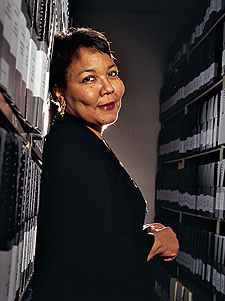Past Finder // Julieanna Richardson // The Historymakers
|
Photograph by Katrina Wittkamp

|
Though she recalls no overt racism from her childhood, as one of only 1,000 blacks in an Ohio town of about 50,000 people, Julieanna Richardson did feel as one apart. She remembers the day her white grade-school classmates, asked to describe their ethnic heritage, proudly called out their European patrimonies. “I felt I had sort of been robbed,” she says. “Everyone wants to have a [history]. That’s the roots of my life’s passion.”
In 1999, that passion inspired Richardson to create The HistoryMakers, a video archive of interviews with hundreds of black Americans in business, the arts and sciences, sports, politics, and entertainment. “The African American community feels it doesn’t have a history,” she says. “We want to reawaken memories, to reconstruct the history of a people who didn’t have time to capture it themselves.”
Working out of their South Loop office, Richardson, 52, and her staff have recorded 1,400 interviews, each about three hours long. By 2011, she hopes to have recorded 5,000-a goal, she acknowledges, that is dependent on funding. “Thus far we’ve raised $8 million,” says Richardson, “but this is a $25-million project.” (For information about using the collection, go to www.thehistorymakers.com.)
After studying at Interlochen Arts Academy, Brandeis University, and Harvard Law School, Richardson took a job with Jenner & Block, which brought her to Chicago. In the 1980s, she served as the city’s cable administrator, created her own home-shopping channel, managed several local cable channels, and started a TV production company. Then, on a trip to Memphis, home to the National Civil Rights Museum, the name “HistoryMakers” came to her unprompted. “I went deep into myself,” says Richardson, “and out came this wonderful and marvelous project.”
In February 2000, she conducted her first interview, with the black radio executive Barry Mayo. Other subjects followed, some of them well known: Harry Belafonte, Ruby Dee, Julian Bond. But an encounter with William Thompson, a veteran of World War II’s all-black Tuskegee Airmen, convinced Richardson that the HistoryMakers was about more than just celebrities. When they met, Thompson told Richardson about the Golden 13, the 13 black men commissioned as officers by the navy during World War II. What’s more, he told Richardson that one of those men-William Sylvester White, then a judge with the appellate court in Chicago-was waiting upstairs. Richardson ended up interviewing both men, who have since died.
“It was one of those moments when I knew I was on the right path,” says Richardson. “It wasn’t about names, but about finding history in places where people didn’t know history existed.”


